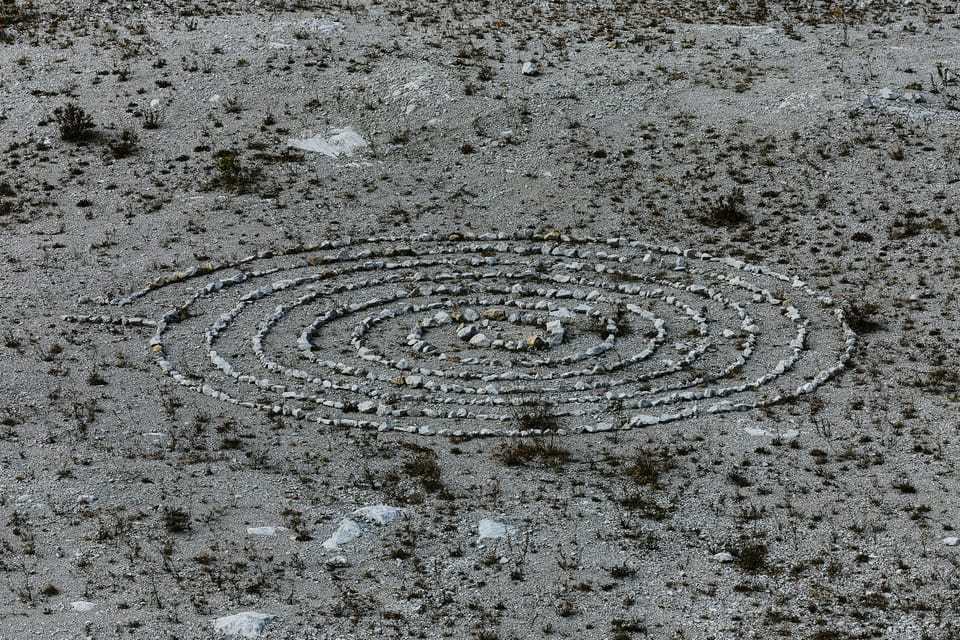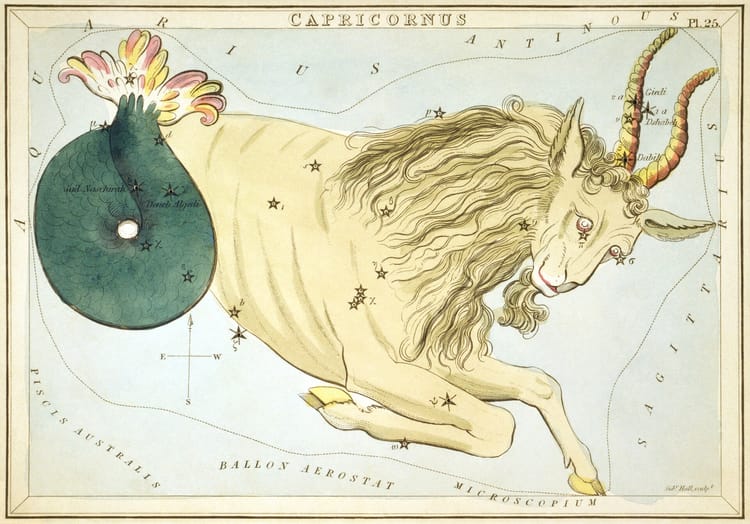Last Quarter: The therapeutics of kink

Hello. It's Friday. The foliage change is well underway now, the autumn rains have begun, a butternut squash is ripening in our garden — and I am incredibly occupied. That's typical for this season, for as low as my moods can become now, keeping my plate full helps me not to languish; likewise, now there is good weather for doing many things that I couldn't comfortably do a couple of weeks ago, and we will soon need to figure out whatever winter plans for the garden and yard we can justify in our new financial situation with my impending layoff.
And on top of that, I have been exceptionally busy on yet another Friday in particular, interfering with my newsletter schedule, because of some medical developments that I won't explain in detail here but that are simultaneously not emergencies and also not something I can just manage later. I feel as if my ability to write here has been hampered lately. I don't enjoy this.
But here we are. Luckily, while I could have written today's subject in long form, I think I can also keep it brief again. And I'm modestly certain that come October, the more thorough essays and reflections will return. The sudden surprises can't last forever. Or so I hope.
To the matter at hand, then: kink. Building on past posts, especially "Kink as primordial principle" and "On violence," I've meant to bring up a cautionary but nuanced addendum regarding kink's therapeutic value. I think it's possible to read my older thoughts and infer that I might regard kink as some sort of socio-psychological cure-all alongside ritual living; since that isn't the case, I wish to clarify my position. And I'll go straight to the (dualistic) point.
Kink cannot accomplish what therapy can
This adage is perhaps the most important. While there are abusive and incompetent therapists, and while modern therapy has its fair share to unlearn in the realm of systemic oppressions, the basic function of therapy is a net good, and it's not something that can quite be copied through similar conversational or reflective environments.[1] Although there are parallels in...
- Getting advice from community elders
- Going to confession or similar religious activities
- Venting on social media
- Venting to friends or family in private
- Keeping a diary
- Prayer or meditation
... none of these have the same effect as conferring periodically with someone who holds no other connection to you except as a sounding board and psychological assistant. This is one way in which I will break with my usual habit and admit a modern invention that does count as "progress" — all those other approaches are also worth taking, depending on your community structure and belief system[2], but I think that good, ethical therapists can hold a uniquely meaningful role in a future, better society.
On the one hand, a therapist has (or is meant to have) no other relation to their client beyond the therapeutic one, and this speaks to our current atomized, transactional culture; on the other hand, from an ethical standpoint seeing a therapist has the distinct advantage of guaranteeing (ideally) they lack conflicts of interest in any advice they might give. I make these parenthetical caveats because in practice, many therapists behave unscrupulously or advise their clients from biased positions that they fail to recognize. Nonetheless, I see something sacred in the basic notion of a person who ought to act impartially as they help someone else in their mental and emotional struggles — though impartially here really means that the client's interest is the therapist's only interest.
I could say much more on what seems to make a good therapist vs. a bad one, including the tale of how long I spent receiving inadequate therapy prior to the very wise person I'm seeing now. But for this post's purposes I'm concerned less with what therapy actually does, and more with what it can do.
And while some flavors of kink delve into behavioral modification (even hypnosis), the environment in which kink takes place is not the same as therapy, and the people performing kink with one another inherently hold a different relationship to one another than the therapist/client relationship. Therefore, many things that occur in kink might appear to have the same effect as some powerful therapy sessions, but the two things should not be conflated.
Most kinksters I know understand as much — indeed, a shared adage among many of us is kink is not therapy — but even understanding it I believe we can sometimes grow tempted to act otherwise. Kink can bring catharsis, and it can bring an endorphin rush, along with floods of dopamine and oxytocin. This makes us feel magnificent, and thus we may give ourselves the illusion that particular psychological challenges we have no longer apply. We can start to crave kink as a quick fix, not necessarily growing addicted but at least stepping into a different reality from the one that we normally occupy — and not cultivating the skills we need for managing our lives and personalities outside of scenes. In the worst cases, then, we become dependent on our kink partner(s) for helping us maintain our psychological baseline, which is not fair to them.
I have trouble articulating how I've made such mistakes in the past, but I know that it's happened. If nothing else, once upon a time I routinely experienced private emotional issues in the kink scene that I could have addressed in therapy but that I tended to assume would resolve themselves if I simply could practice more kink; of course this assumption was very wrong. And likewise, I used to explore certain kinks with some awareness of psychological risks they carried, but I did not properly take care of myself in light of those risks. I was always seeing a therapist throughout these stretches, but she wasn't the right fit for me, and though that was somewhat her responsibility to correct, for quite a few years I didn't give myself the time to think about what therapy wasn't but should have been doing for me; I thought the difficulties I was experiencing through kink were not connected to my mental health, when in fact they absolutely were.
Lessons since learned. But having said this, even being a steady advocate for most people to find themselves a therapist, when I say kink is not therapy the negation is a two-way street. Indeed:
Therapy cannot accomplish what kink can
Kink is therapeutic, in that when people practice it ethically and conscientiously it can be a different mode of healing psychological wounds and learning a new identity or behaviors. And this mode can only really be achieved through the very intimacy that therapy precludes. The stakes are higher, communal governance is wiser, and the induced changes may be harder to quantify or verbalize; however, a powerful magic is at play, fueled by somatic awareness and explicit communication.
I would never recommend kink over therapy for matters that would best be sorted out among people who do not need to interact with one another on a regular basis outside the therapeutic process. But when continuous intimate interaction is itself a learning opportunity, a kink partnership has its own offerings. This doesn't mean avoiding therapy in that context, either, but what's discussed in therapy can generally only be discussed, whereas kink provides one context for structured praxis.
That structure might manifest through outright D/s protocol, but also through the trust required to receive and give pain, or to cede and gain control. In kink we can also learn a great deal of patience, and we can come to live fully in our bodies. Some therapy involves exercises along similar lines — somatic therapy, for instance — but the trust established between the therapist and the client is so narrow and careful, I do not find that it has the same effect as that which is established on a perpetual basis between dominant and submissive, sadist and masochist, rope top and rope bottom, and so forth.[3]
It's a very loose analogy, but I think I would compare kink's therapeutic aspects to getting a massage when one's body is injured. To truly repair that injury, you will need formal physical therapy; and the sort of massage you receive should take care not to inadvertently make the injury worse. But a massage will also provide comfort that physical therapy does not, and even when it doesn't truly help to repair what's damaged (although it can) it may be valuable for rendering the flesh supple enough to stay resilient for new stress.
I would of course still hardly "prescribe" kink to someone who hasn't already tried it, yet I cannot simply say kink is not therapy without examining the other side of that coin. I hope, although I haven't given this topic nearly the full attention it deserves, that I've explained enough of my stance for now, and that what I've managed to say can be kept in mind alongside earlier posts about kink. It will of course also inform what I have to say about kink in the future.
[1] Nor can pharmaceutical interventions hold a candle, even though they have their own value as well. After roughly one year on my first psych med, I'm finally sold on chemically treating my anxiety alongside using other modalities.
[2] And in terms of venting to friends and family (or partners for that matter), I adamantly oppose doing this too often. Part of a loving, intimate connection is to support one another emotionally, but turning one's entire sphere into nonconsenting therapist-figures is exploitative. I trust social media for this purpose even less, too; I am quite guilty of using it that way on occasion, but where the parasocial is involved I do not find it fair to ask for the same emotional support as I could deserve to ask from people genuinely close to me.
[3] I am focused here on kink in long-term relationships, and not so much on casual kink scenes or highly compartmentalized ordeals where the participants may have extensively negotiated but are still largely addressing their emotional "goal" in a single time-and-place. That isn't to say those situations aren't potentially therapeutic as well, but I think the benefits I've been interested in here are easier to see (and perhaps achieve) when played out over months or years.
Thank you for reading. Once again, I apologize that this is not necessarily the fare that Salt for the Eclipse has usually provided; but I highly suspect that my Friday focus will become less divided by next week. At that time, I will have another kink post about impact play. The week afterward, I'll be writing about mushrooms.





Member discussion